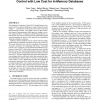Free Online Productivity Tools
i2Speak
i2Symbol
i2OCR
iTex2Img
iWeb2Print
iWeb2Shot
i2Type
iPdf2Split
iPdf2Merge
i2Bopomofo
i2Arabic
i2Style
i2Image
i2PDF
iLatex2Rtf
Sci2ools
125
click to vote
PVLDB
2016
2016
BCC: Reducing False Aborts in Optimistic Concurrency Control with Low Cost for In-Memory Databases
The Optimistic Concurrency Control (OCC) method has been commonly used for in-memory databases to ensure transaction serializability — a transaction will be aborted if its read set has been changed during execution. This simple criterion to abort transactions causes a large proportion of false positives, leading to excessive transaction aborts. Transactions aborted false-positively (i.e. false aborts) waste system resources and can significantly degrade system throughput (as much as 3.68x based on our experiments) when data contention is intensive. Modern in-memory databases run on systems with increasingly parallel hardware and handle workloads with growing concurrency. They must efficiently deal with data contention in the presence of greater concurrency by minimizing false aborts. This paper presents a new concurrency control method named Balanced Concurrency Control (BCC) which aborts transactions more carefully than OCC does. BCC detects data dependency patterns which can mor...
Cryptology | PVLDB 2016 |
| Added | 09 Apr 2016 |
| Updated | 09 Apr 2016 |
| Type | Journal |
| Year | 2016 |
| Where | PVLDB |
| Authors | Yuan Yuan, Kaibo Wang, Rubao Lee, Xiaoning Ding, Jing Xing, Spyros Blanas, Xiaodong Zhang |
Comments (0)

